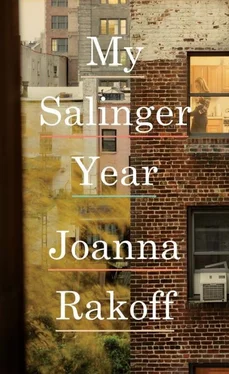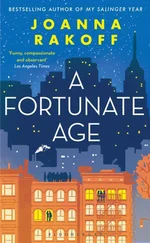The escalator dropped me in a hallway, carpeted in a pattern of dark red and gold, punctuated by large potted plants. I paused for a moment, unsure of where to go. If I walked straight, through the archway in front of me, surely I’d eventually reach the west side of the building, the main entrance, which opened onto Park. I could exit through that entrance, then walk a block over to my office on Madison. But before I made it through the archway, I noticed a tiny, dim storefront on my left: an antiquarian bookshop. My breath caught with delight. I had stayed at hotels of this sort as a child, with my parents: the King David in Tel Aviv; The Breakers in Palm Beach; Brown’s in Denver. Before dinner, my mother and I would browse in the lobby shops, trying on sunglasses and pendants and scarves. Of course, I thought, a grand hotel in New York—the cultural capital of the country—would have a book shop.
I was close enough to the glass now to make out some of the titles: a beautiful, ornate copy of Don Juan; an oversized edition of Peter Pan with what appeared to be the original illustrations; the moss-green binding of Alice in Wonderland . And there, at the center—the window’s most prominent spot—a book in blazing red, a book whose cover was so familiar I almost didn’t see it, until I did, and gave a start, so strange was it to see this book out of context. It was, of course, a first edition of The Catcher in the Rye , its cover bearing an illustration of a carousel horse rearing in fury, or fright. I knew now—Hugh had told me—that Salinger’s neighbor in Westport, a painter named Michael Mitchell, had drawn that horse specifically for Salinger, for Catcher . For the paperback, the publisher had chosen a more explicit image—Holden Caulfield in a red hunting cap—that Salinger, not surprisingly, had loathed. Out of alliance with Salinger, the Agency kept no copies of that maligned edition in the office.
But a few copies of this first edition, with its raging stallion, sat across from my desk. I had memorized the font on the spine. I saw it in my sleep. This copy was different in that it was slightly more pristine, the red more brilliant, the white more white. And that it had on it a price tag: twenty-five thousand dollars.
Around the corner from the bookshop, I found a ladies’ room where I washed my hands in the water that came forth from heavy gold-toned faucets, drying them on paper towels as thick and soft as cloth, then smoothed down my hair and swiped my lips with gloss: a five-minute vacation from the dishes in the bathtub, the ramen dinners. For a moment, I indulged myself: imagined that my parents were in the lobby waiting for me, that we were going to the Met, would have lunch under the skylights, amid the Rodins, as we did when I was a child. Then I slung my bag back over my shoulder and walked out, past the bookshop, through the archway, and into the hotel’s upper lobby, which was filled with businessmen. Men , all of them men, with short hair and shiny shoes. They were young—some as young as I, their faces dewy and unlined, their smiles painfully open and warm, so different from Don’s tight grin—and I wondered who they were and what they were doing here. Was it money that allowed them to smile that way? Money and security?
Nine thirty was approaching now, so I hurried down the wide, royal staircase that appeared in front of me—my shoes sinking into the deep carpet—and descended to the lower lobby, where I found even more men, checking in and out, affixing name badges, making calls on the house phones, talking to the concierge or the doorman; men laughing in crowds of three and four, or standing alone, flipping through dense binders of charts and graphs. They turned and glanced at me as I walked by, smiling and nodding as if I were part of their world, the realm of currency and privilege. “Good day, miss,” the doorman said to me, tipping his hat. “Can I get you a cab?”
“Oh, no, thank you,” I replied, in a voice that was not quite my own. “It’s such a beautiful day. I’d rather walk. I’m just going a few blocks.”
“It is a beautiful day,” he agreed. “You enjoy it now.”
“Thank you,” I said in this alien voice—the voice of the me who stayed in suites at the Waldorf and took cabs across town in inclement weather—and walked through the door he held open for me, onto Park, where a battalion of tulips had commandeered the median strip. They swayed in the warm breeze, their heavy heads dipping south as one.
• • •
Now that the sun was finally out, the darkness of the Agency struck me as mildly oppressive, or perhaps depressive. It’s spring , I wanted to shout to Lucy, in her black shifts, nunlike and sober, and my boss, in her baggy brown suit, and even to the forest-green carpeting that muffled our footsteps, the deep brown wood that framed each room in bookcases. In the winter, the darkness had served as a cozy refuge, but now I counted the minutes until lunch, when I could walk in the warm sun, my arms bare. “Pretty frock,” Lucy called as I passed her office. “Is it an antick-cue?” Before I could answer, she pushed herself up from her chair and joined me. “I’ve been wanting to ask,” she said, her voice slightly below its normal throaty boom. “Are you eating?”
I looked at her uncomprehendingly. “Eating what?” I asked.
“Well,” she began, then broke into nervous laughter and gestured theatrically at my dress. My eyes followed her hands, and I suddenly saw what she meant, or part of what she meant: my dress swam on me. “You’re looking a bit”—she searched for the right word—“ wan.” Maddeningly, I felt as if I might cry. “I know it can be really hard to live on an assistant’s salary.” She laughed again. “If anyone knows, it’s me.”
“I’m eating,” I told her, with a big smile. “I am.” But was I? With my new bills, I could barely live. Every day, I called the bank to check my balance, and all too often I’d dipped into my overdraft, even though I budgeted every cent and painstakingly balanced my checkbook. I shopped for groceries once a week, on Saturday morning, carefully totaling up my cart before I approached the register, putting back anything too extravagant, like packaged cookies and cereal. For lunch, I limited myself to five dollars, which bought me a sad little Greek salad at the chain sandwich shop around the corner: limp romaine lettuce, sometimes turning brown at the edges; a pale winter tomato; a few translucent slices of tomato and pearly cucumber; and a crumble of feta, atop which sat one slim, salty olive. That olive made it all worth it.
That day, though, I did something I’d never, ever done: I walked directly and purposely to the elegant food shop on Forty-Ninth from which the agents obtained their lunches. Around me, the Masters of the Universe ordered frisée salads, rubbing elbows with their female counterparts, thin, tanned women with Cartier bangles dangling from their thin, tanned wrists. The sandwiches sat like pastries on silver cake stands. After much deliberation, I chose a slender flat of bread filled with some sort of pink cured meat. At the register, I grabbed a chocolate cookie, ordered a coffee, and handed over a crisp twenty. I was not, at that exact moment, overdrawn, but my heart still sped up as I placed my meager change in my wallet. Sandwich in hand, I walked over to Fifth, the sun warming my shoulders, sat down on the steps of St. Patrick’s Cathedral with the tourists, and took a bite, a dense, salty, oily, warm bite. It was, there was no doubt, the most delicious sandwich I’d ever tasted. I ate half, planning to save the remainder for the next day, then went ahead and devoured that, too.
Читать дальше












